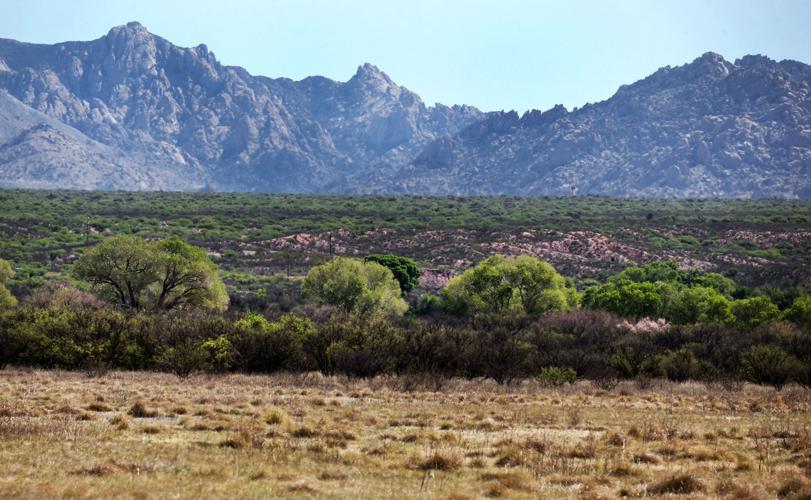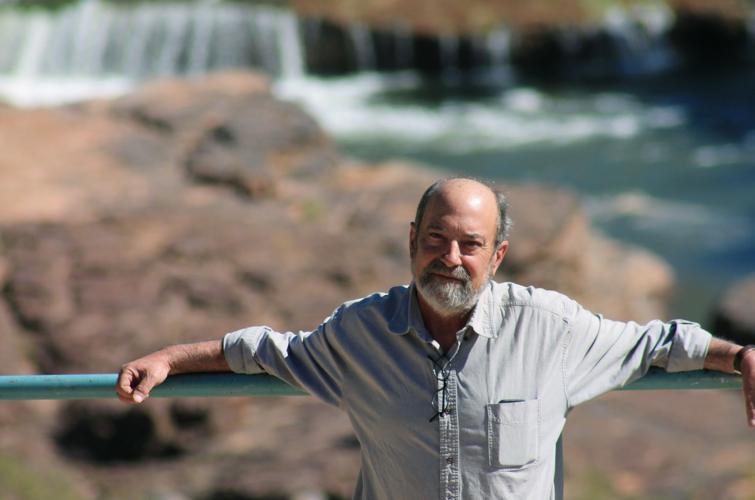Allegations of political interference in the federal handling of a 28,000-home Benson development proposal are strong enough that they warrant release of a slew of heretofore confidential records, a judge has ruled.
Environmentalists say — but Interior Department officials deny — these documents will prove a federal whistleblower’s allegations, first reported in the Arizona Daily Star, that politically motivated interference from Washington, D.C., higher-ups overrode a science-based decision about the Villages at Vigneto development.
U.S. District Judge Raner Collins of Tucson ruled Tuesday that Steve Spangle’s allegations “support a showing of bad faith” by high-level federal officials.
That showing justifies making public internal documents laying out written communications among federal officials, Collins wrote.
He said comments by Spangle, a retired U.S. Fish and Wildlife Service official, call into question the entire agency’s decision-making on the development planned near the imperiled San Pedro River.
The Justice and Interior departments resisted releasing these documents during the protracted litigation over a federal Clean Water Act permit for the project.
Federal agencies typically argue the documents aren’t relevant to understanding an agency decision or that their release could chill officials from expressing candid views on controversies.
Collins’ ruling gives federal officials 30 days to reveal the documents.
In reaction, an Interior Department spokesman said: “The department always complies with court rulings — and will do so here, as well.” The spokesman, Ben Goldey, added that the documents, when released, will show that no political pressure on Spangle occurred.
Interior secretary’s emails among records ordered released
Collins’ eight-page ruling said: “This Court cannot ignore the gravity of Director Spangle’s statements indicating political interference. Director Spangle plainly admitted that he was forced to concur” on a decision that was his alone to make.
Spangle, as the wildlife service’s top official in Arizona, had originally ordered a detailed analysis of Vigneto’s environmental effects, particularly the effects on the nearby San Pedro of its planned groundwater pumping.
But Spangle told the Star, and later The Arizona Republic and CNN, that the pressure from above — which he suspected came from then-Deputy Interior Secretary David Bernhardt — in August 2017 forced him to reverse his earlier decision.
Two weeks before that alleged interference, Bernhardt held a private meeting with the Vigneto developer, a court record from the Justice Department shows.
The developer, Mike Ingram, CEO of Phoenix-based El Dorado Holdings, had donated $50,900 to President Trump’s political committees since 2015, CNN has reported.
U.S. Rep. Raúl Grijalva, D-Tucson, and his House Natural Resources Committee are investigating the allegations of political interference.
Among the records that must be released under Collins’ order are all emails about Vigneto by Bernhardt, who is now secretary of the interior.
Interior officials have strongly denied Spangle’s allegations, saying that nothing more occurred than an internal legal dispute over how best to enforce various Endangered Species Act requirements. They have said they simply got new information about the project, such as statements from the developer that Vigneto could be built even if the Clean Water Act permit were to be denied.
Environmentalists sued for “government accountability”
Interest in obtaining proof of Spangle’s charges prompted environmentalists to seek court-ordered release of these documents.
“We want all communication within the agency regarding the decision, all the way up the chain” to Bernhardt, because he was involved in the decision, said Stu Gillespie, the environmentalist attorney who sought the records.
Collins’ ruling also clears the way for Spangle and another wildlife service biologist, Jason Douglas in Tucson, to give sworn testimony in the lawsuit, project opponents said Thursday.
Goldey, the Interior Department spokesman, referred questions about a potential appeal to the Justice Department. Justice Department spokeswoman Danielle Nichols said, “We have no comment” on last week’s ruling.
The records were requested on behalf of a half-dozen environmental groups that have sued to overturn a 2019 decision by the U.S. Army Corps of Engineers reinstating a previously suspended Clean Water Act permit for Vigneto. The analysis Spangle originally ordered would have delayed that permit reinstatement.
“This is a crucial step forward in safeguarding the Endangered Species Act and exposing the improper political interference that occurred at the Fish and Wildlife Service during the Trump administration,” said Gillespie, an attorney for the environmental law firm Earthjustice. “The court not only underscored the gravity of Director Spangle’s statement, it also rejected the government’s attempt to cover up that interference and withhold critical evidence from the court and general public.”
While the judge and Gillespie referred to Spangle as director, his title was actually field supervisor for the wildlife service’s Arizona Ecological Services Office in Phoenix, making him the service’s top official in Arizona.
The Sierra Club’s Sandy Bahr called Collins’ ruling a major victory for government accountability.
“The San Pedro River region is one of the most biologically diverse areas in the Southwest, and the public has the right to know why the Fish and Wildlife Service, after finding that the Army Corps failed to fully evaluate impacts of the Vigneto development on this fragile ecosystem, abruptly changed course to find that the Corps’ extremely limited analysis was sufficient,” said Bahr, director of the club’s Grand Canyon chapter.
“No political Interference”
But in an email Thursday, Goldey reiterated Bernhardt’s statement to the Star back in October, “that the only direction that came from him was to follow the letter of the law.”
“The Secretary has always been interested in having as many of these documents made available because they clearly demonstrate no political interference took place,” Goldey wrote.
When asked afterward why the Justice Department sought to block the documents’ release if Bernhardt wanted them released, Goldey simply reiterated his above statement.
Goldey added that, “In fact, these documents (which have already been shown to Congress) demonstrate that Mr. Spangle himself endorsed the process while employed at the department in emails to the Arizona Daily Star, High Country News, and other media outlets.”
He cited several articles from fall and winter 2017 in which Spangle gave various reporters such statements as “we did not ignore any science” and “the legal situation required us to retract that position.”
Spangle’s allegations of political pressure came nearly 18 months after he made those comments, and about a year after he retired from the wildlife service in March 2018.
Decision reversal was boon to Vigneto
At issue in the court dispute is why Spangle decided in fall of 2017 to reverse his previous, longstanding position that federal law required a full-scale environmental analysis of Vigneto’s effects, including its potential impact on the San Pedro. It is the Southwest’s last major undammed river and a major flyway for hundreds of North American bird species.
In spring 2019, Spangle told the Star that he had been told in August 2017 by attorney Peg Romanik, in the Interior’s Solicitor’s Office, that a “high-level political” appointee at Interior had said Spangle’s position on Vigneto wasn’t the Trump administration’s position.
That official’s name was never disclosed, and Romanik has never publicly discussed the case. But over time, official calendars, investigative reporting and a federal court document have shown that Bernhardt played a key role in the outcome.
In addition to Bernhardt’s private meeting on the matter with Ingram, Bernhardt also met with Romanik twice on the day Spangle said he received the crucial phone call from her, Interior Department calendars show.
But while acknowledging Bernhardt’s involvement in the case, Interior officials have maintained that they wanted Spangle’s ruling changed because it was legally incorrect.
To get to facts, environmentalist attorney Gillespie requested such materials as draft reports, internal comments, emails and meeting notes from the Interior Department about its decision-making on Vigneto.
In opposing the request for these records, the Justice Department said: “The bare fact that predecisional, deliberative materials were generated during the decision-making process does not transform these materials into documents that were ‘considered’ by the decision-makers in any relevant sense and therefore part of the record.”
But Collins’ decision said that Spangle, as an executive and decision-maker for a federal agency, “surely understood the importance of his public proclamations of political interference when he made them, on the record, to the media.”
Feels like vindication
Reacting to the ruling, Spangle said, “It at least seems to put some credibility in what I’m saying, which is just telling the truth. This whole thing should be as transparent as possible, so I’d like to see anything that’s relevant admitted to the record.”
But in the end, he said, the entire court case over the Vigneto permit will turn on whether his original interpretation of law — that the project’s indirect impacts on species and the river must be considered — turns out to be legally correct, or if the current administration’s position prevails, that they don’t have to be considered.
“The long-term effect of groundwater withdrawal is of major concern,” he said.






